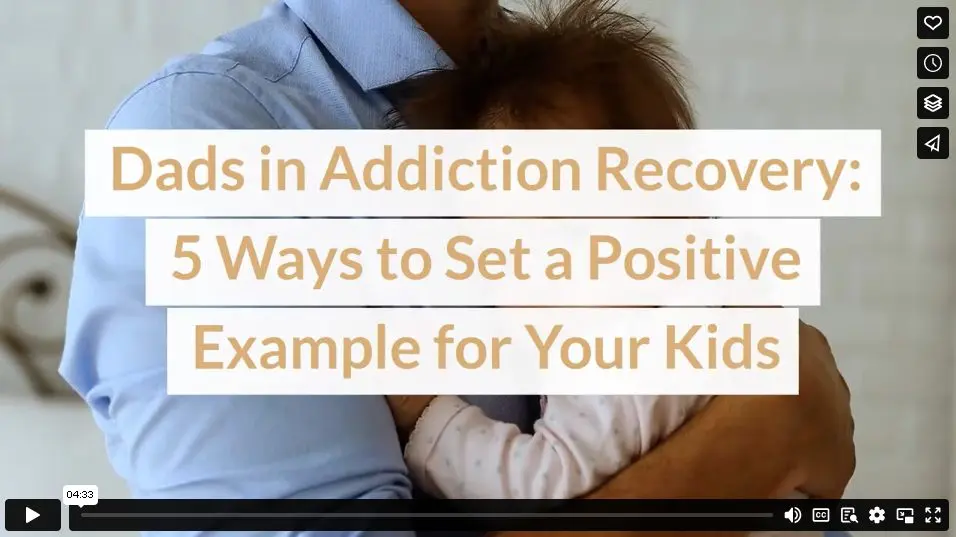If you’re a parent, you know how common parental guilt is. You love your kids so much that you constantly question whether you make the right decisions for them. Throw an addiction into the mix, and the parental guilt intensifies to a whole new, unbearable level. However, leading by example and getting help sets the ultimate example for your children. You’re setting a precedent and showing them that nobody is perfect, sometimes we need help, and we should always get help when needed.
Navigating the throes of recovery while at the same time trying to be a present and loving father can be a lot to handle. You may have trust to rebuild and relationships to mend. It’s time to stop dwelling on the past and start a necessary change today.
Whether you’re just beginning your journey at a men’s treatment center or you’re well into your recovery, follow these five tips to set a positive example for your children and be the best father you can be while dealing with your recovery.
1. Open Communication
One of the best things you can do is talk to your children instead of keeping them in the dark about your addiction and recovery. With your genetics, they may be more prone to addiction than their peers. For this reason, education, information, and awareness are crucial as you raise your children. Letting your kids in on your recovery journey shows strength, not weakness.
Conversations about addiction will vary based on your children’s ages. Older kids will have a better understanding of what addiction is. Younger kids may have more difficulty grasping it, so keep the conversation at their level. Explain that addiction is a disease that negatively affects you and that this disease has side effects, including behavioral changes. Explain that this disease also requires treatment, just like many other diseases.
Using your judgment, you can talk about your personal experiences and struggles with addiction. You know your child’s personality best and will know how much or how little to disclose. It’s important to teach your children that your addiction is not their fault. Emphasize that your children are the biggest motivators for getting better.
Often, children can handle more than we think and have more empathy than we realize. Sharing your journey with them may improve their behavior as they learn to empathize more and feel comfort in knowing you trusted them enough to have a mature conversation.
2. Family Therapy
Therapy can be healing in many ways. Sometimes, when you’re so close to a situation, it can be challenging to decipher how to approach conversations. A professional third party can help navigate the conversations while getting to the root of emotions and behaviors that may be a result of your struggle with addiction. A family therapist will give you tools for better communication to ensure everyone is heard and understood, ultimately strengthening and repairing your family unit.
Getting your family to therapy can be a challenge. Some family members may be reluctant to go. You may feel embarrassed if people find out your family is going to therapy. Try your hardest to mute the outside noise and tell yourself that this will positively impact your relationship with your family.
Family counseling gives children healthy tools for dealing with big emotions and other issues. This can set a healthy foundation for them in the future if they ever struggle with an addiction themselves.
3. Quality Time
Quality time is everything to children. They don’t need you to be perfect or fit any mold; they just want your love and attention. Just being there impacts them more than you know. Make family dinner a priority, carve out time for your children, and plan daddy/daughter or daddy/son dates. Making 10% more effort can make a 100% difference in your child’s happiness.
4. Patience
Being a parent adds another layer to addiction recovery. Be patient with yourself, be patient with your recovery journey, and be patient with your family. Recovery doesn’t happen overnight, and it takes time to rebuild relationships. Strive to live in the moment and avoid living in the past. You may feel guilt and shame, but give yourself credit for the choice you’ve made to get better and be sober. You can’t change the past, but you can decide your present and create your future.
5. Responsibility
Denial is common among those in addiction recovery. Taking responsibility for your life and choices sets the foundation for a successful recovery. It shows your children the importance of owning up to mistakes and dealing with them head-on instead of running from them.
One of the best ways to take responsibility for yourself and gain your control back is to enter an addiction recovery program. Our treatment centers in Utah and Idaho offer drug and alcohol treatment for fathers. They give you a community of men who understand what you’re going through and will help hold you accountable. The more you take responsibility and show your efforts to conquer your addiction, the prouder your kids will be of you and your hard work.
As a father, it’s normal to feel guilt and shame about what your children have been through as a result of your addiction. Don’t let yourself live in that shame. Instead, choose to change and use your experience as a teaching moment.
Video
Infographic
Balancing recovery while being a loving father can be challenging. Whether you’re starting at a men’s treatment center or already in recovery, discover in this infographic five tips to set a positive example for your children and be the best father you can be.


